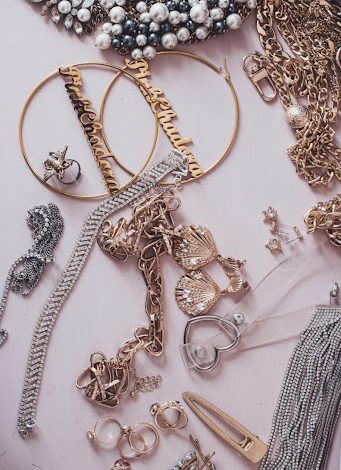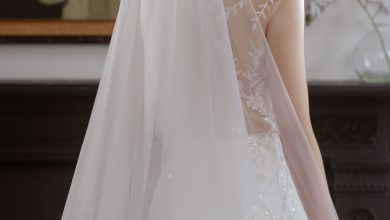How To Clean Jewellery At Home – Your Ultimate Guide

Jewellery may be the most valuable accessory in a person’s wardrobe. It has the power to enhance your overall look and holds a lot of sentimental value. Over time, your jewellery can accumulate dust, dirt, grime, sweat, and residue from the various products you apply on your hands and body and become discoloured, losing their glow and sparkle.
You can always go to a professional jewellery cleaner to get your jewellery cleaned, but if you don’t have the time for that, you can restore your jewellery to its former glory at home if you have the right products and knowledge.
For your ease, we have collected all the best and most effective ways to clean jewellery at home. We have also divided the tips and tricks on the metal type so you don’t end up further damaging your gold, silver, or gemstones.
Table of Contents
How To Clean Silver
As a result of a chemical reaction between sulphur and silver in the air, silver jewellery can tarnish and turn black. Because of this, a thin layer of rhodium is applied as a protective layer, but it also wears off over time and blackens your beautiful accessories.
Luckily, to bring back the lustre and shine of tarnished silver, follow the easy cleaning tips below.
Using Dish Soap
The simplest and easy way to clean your silver jewellery at home is to use dish soap and warm water. Take a bowl of warm water, add a few drops of dish soap, soak your silver jewellery pieces for at least 10 minutes, and take them out. Then, take a soft bristle brush or a toothbrush to reach the crevices, gently rub them, and rinse with warm water.
Dry the silver jewellery pieces with a microfiber cloth and paper towels. Try not to use abrasive materials to wipe your jewellery as it might scratch the trinkets.
2. Toothpaste
Another way to clean silver jewellery at home is to use toothpaste. For this, you need to find non-abrasive and non-gel toothpaste and take a tiny amount on your finger or a microfiber cloth. Then, rub the toothpaste onto the jewellery in a circular motion to remove the tarnish and give it a polished look. Leave it on for 5 minutes and then gently wash with warm water.
3. Aluminium Foil and Baking Soda
One of the oldest tips for cleaning silver jewellery or cutlery at home is to give it a bath in aluminium-soda. It requires more work, but it’s definitely worth it. Here, you first need to take a glass or ceramic pan and coat it with aluminium foil with the shiny side up. Then, add a gallon of water and 1.5 tablespoons of baking soda. Bring the mixture to a boil, add your jewellery pieces, and leave them inside for 15 minutes. Take them out with the help of kitchen tongs and dry them with a microfiber cloth, and you are done. Make sure the jewellery is completely silver and has no encrusted gems.
How To Clean Gold
Gold jewellery is a statement piece; everyone has a family heirloom or ring passed down through generations. Depending on if you wear your gold jewellery daily, you need to clean it at least once a month to ensure it retains its shine. Experts recommend a gentle cleaning at home every few weeks as harsh chemicals can wear down the metal more quickly. Since gold and metal are slightly similar metal in properties, they have similar cleaning methods. Let’s discuss the most effective tip below.
Detergent + Ammonia
For this purpose, we suggest using Dawn dish soap as it is safe and won’t damage your jewellery. First, fill warm water in a bowl and add a few drops of dish detergent.
Then, add a few drops of ammonia and dish soap and mix. Let the gold jewellery pieces soak in the solution for 20 minutes, and take a soft bristle brush to clean them gently. After the time is up, take them out, rinse with warm water, and dry with a microfiber cloth.
If you want your gold jewellery to last long, we recommend avoiding a few materials and chemicals that can weaken and damage its structure. For instance, chlorine and gold don’t suit each other, so if you plan on going to a swimming pool or even for a bath, we recommend taking all gold jewellery pieces off. Similarly, avoid contact with lotions and cleaning products.
How To Clean Pearls
Pearls are a showstopper; to keep them that way, you need to care for them properly. Pearls are extremely fragile because of the delicate nacre-coating on top of it, also known as mother-of-pearl. Nacre is an organic substance secreted by molluscs in the formation of pearls. The thicker the coating is, the stronger the pearl is. Usually, that’s not the case, and you need to know the proper way to clean pearls at home.
The best way to prevent permanent damage to your precious pearls is to clean them with a soft microfiber cloth after every wear. As a rule, pearls should be the last thing you wear and the first thing to take off.
If you see your pearls are visibly stained, we recommend creating a mixture using lukewarm water and dish soap (mild), dipping a soft microfiber cloth in this mixture, and using it to wipe your pearls. Ensure that you are gentle throughout the process and don’t soak the pearls in the solution as you did with gold and silver. Next, return with another soft cloth dipped in fresh water and remove any dish soap left behind. Lay out your pearls on a flat surface and allow them to air dry.
We recommend taking your pearls to a professional jeweller once or twice a year to keep their shine and lustre.
How To Clean Gemstones
While the cleaning method for silver and gold jewellery is straightforward, adding gemstones to the mix makes it trickier to clean them. This is because each gemstone has different chemical and physical properties, and they might be unable to handle the harsh chemicals and cloths used to clean other metals.
Thus, you first need to identify the gemstone type in your jewellery and clean it accordingly. Often, people rely on the gemstone’s hardness and believe it can withstand harsh chemicals or pressure. This is false. Hardness only shows their ability to resist scratching, which isn’t a measure of their exposure to different cleaning solutions.
The most fool-proof method is to soak the jewellery piece in warm water and a mild dish soap mixture, let it sit for a few minutes, use a soft brush or toothpick to clean the dirt, and then dry with a microfiber cloth.
But remember that gemstones like pearls and opals should never be cleaned by submerging in any water-based mixture as they are fragile and highly porous.
How To Clean Artificial Jewellery
Artificial jewellery is relatively easy to clean, but there are a few things you need to look out for. For instance, it is better not to soak artificial jewellery in water-based solutions because most times, the gemstones are attached to the pieces with glue, and soaking them will cause the glue to loosen or dissolve and dislodge the stones.
Moreover, metal artificial jewellery uses poor-quality metallic alloys, and soaking them may lead to rusting over time. Thus, the best way to clean artificial jewellery at home is to create a mixture of dish soap and warm water, dip a clean, soft cloth in it, wring it well, and wipe away any dirt and grime from it the jewellery pieces. After cleaning, lay the pieces upside down on a paper towel, so the moisture doesn’t set in.
How To Clean Diamonds
Diamonds are a girl’s best friend, and you should treat them properly. Over time, you might notice dullness, discolouration, and cloudiness in your diamond jewellery. But don’t worry, we have a list of effective cleaning methods available.
- We recommend purchasing a jewellery cleaner since you don’t want to damage your valuables. Ensure you use one that is specifically used for cleaning diamonds.
- You can also clean your diamond jewellery with warm water and dish soap mixture. Soak the pieces for a few seconds, wipe the dirt and grime away with a microfiber cloth.
- An ultrasonic machine is the best way to get your diamond jewellery cleaned. For this, you need to go to a professional jeweller. It helps restore the shine and lustre and gives your jewellery a new and polished look.
Conclusion
Your jewellery is valuable to you, and finding the best-customised jewellery is harder than ever. Thus, to ensure you get your money’s worth, you need to clean them routinely and prevent damage and dirt buildup by storing them properly. Follow the steps mentioned above and keep your jewellery shining and sparkling forever. We hope this article helped!



